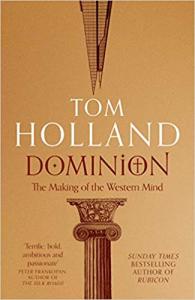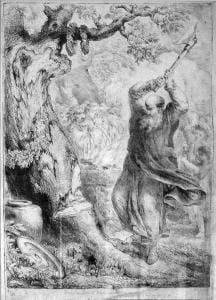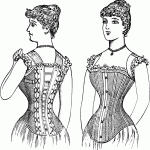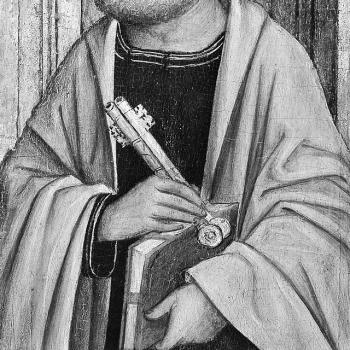There are many ways to assess works of history. Does a book make a strong argument? Is the information accurate? Is the book coherent? And then, more basically, is it a pleasure to read? In that vein, is it characterized by eloquent prose, character portraits, quirkiness, and a dash of humor?
 Tom Holland’s Dominion is a remarkable book. There are many histories of Christianity. Diarmaid MacCulloch’s terribly titled Christianity: The First Three Thousand Years is among the best in its effort to trace the global spread and development of Christianity. Robert Louis Wilken’s better-titled The First Thousand Years: A Global History of Christianity is my favorite concise survey of the faith’s first millennium. Many church historians have written multi-volume histories of Christian thought, which carefully trace the ecclesiastical fractures of the followers of a founder who urged them to remain united.
Tom Holland’s Dominion is a remarkable book. There are many histories of Christianity. Diarmaid MacCulloch’s terribly titled Christianity: The First Three Thousand Years is among the best in its effort to trace the global spread and development of Christianity. Robert Louis Wilken’s better-titled The First Thousand Years: A Global History of Christianity is my favorite concise survey of the faith’s first millennium. Many church historians have written multi-volume histories of Christian thought, which carefully trace the ecclesiastical fractures of the followers of a founder who urged them to remain united.
Dominion is different from the above options. Holland did not set out to write a comprehensive history of Christianity. At the outset, he states that he will not trace the development of the Eastern churches beyond antiquity. Rather, Dominion “explore[s] how we in the West came to be what we are, and to think the way that we do.” It is worth noting that the book’s purpose and focus fit far better with its British subtitle (The Making of the Western Mind) than with its American counterpart (How the Christian Revolution Remade the World). The latter is a touch misleading. It’s not quite as bad as swapping Philosopher’s Stone for Sorcerer’s Stone with respect to Harry Potter, but one wonders exactly why Americans need books to have America-specific subtitles.
The Making of the Western Mind perhaps more old-fashioned: the role of Christianity in the shaping of Western Civilization. Indeed, earlier in the century, instructors and scholars sometimes used “Christian Civilization” and “Western Civilization” interchangeably and took for granted the role of the Protestant Reformation (“the revolution that killed God,” Holland terms it) in bringing about the values of liberal democracy, including freedom of conscience. Holland’s conclusions run in this vein: “Whether it be the conviction that the workings of conscience are the surest determinants of good law, or that Church and state exist as distinct entities, or that polygamy is unacceptable, its trace elements are to be found everywhere in the West.” To this list, one might add a concern for the poor and for children and mothers. After all, doing things “for the least of these” is by far the most common Bible verse to come up in Democratic presidential debates. Holland observes that “charity lay at the heart of Calvin’s vision,” especially when it came to refugees, values perpetuated in a roundabout way by Angela Merkel early in the twenty-first century.
As many reviewers (including our own Philip Jenkins) have noted, these arguments are tenuous. Polygamy, sure, but otherwise things get tricky. Can one really give credit to Christianity for the Western respect for conscience if throughout most of Western history, Christians argued that it was necessary for church and state to compel the conscience? And while Calvin practiced charity, most Christian governments have proceeded with a blithe indifference to the poor. Christianity was revolutionary in its casting off of ethnic, sexual, and other boundaries, but Christians happily reimposed them whenever they had the chance to do so. Humanism, a respect for conscience, an appreciation for reason and science – certain streams of Christian thought contributed to these developments, but there were other streams as well, and sorting out exactly how much credit one might assign to Christianity is a very tall order. Holland also places a strange weight on Saint Augustine’s “Love, and do as you will.” Yes, Jesus, Paul, Augustine, and the Beatles all placed a central emphasis on love. But if love was all one needed, the Beatles meant something rather different than did their Christian predecessors.
At the same time, this is a rather easy critique to make, perhaps too easy. Is Holland wrong to term Christianity “the single most transformative development in Western history”? What would other competitors be? Ancient Greece and Rome? The Enlightenment? Capitalism? Those are serious competitors, but so is Christianity. Holland suggests at the outset that he does not want to preach to the choir. Those that think all of the sizzle of Western Civilization is found in Athens and Rome, and those who equate Christianity with superstition, intolerance, and bigotry, should take another look.

Those readers who take in the sweep of Dominion will find themselves consistently startled and surprised. To be sure, Holland makes the stomach turn with his descriptions of executions and the castrated Galli, but he also paints compelling portraits of countless figures in his march through the centuries. Some of these are well known, such as Luther or Galileo. But whereas many historians of Christianity discuss the bishop and theologian Gregory of Nyssa, Holland takes time to introduce his sister Macrina, who rescued abandoned abandoned infants from the trash heaps. Perhaps less admirably, an ascetic named Theodore, who ate only lettuce. This is what I meant by the outset by the sheer pleasure of well-crafted history. Holland has a gift for the brief, pithy quotation, as in this gem from the ninth-century Saxon Heiland: “Here in this world, in Middle Earth, they come and go, the old dying and the young succeeding, until they too grow old, and are borne away by fate.” And yes, Tolkien makes a few appearances in the later chapters.
Holland perceives in the marrow of Christianity a few revolutionary ideas. Although they sometimes became numb by the present, Christians also exhibited a consistent hope that the world can be made new, that present miseries and injustices will give way to the Kingdom of God. The Christian revolution in this sense has never succeeded, but that hope still animates movements for change around the world. “Paul was preaching a deity who recognised no borders, no divisions,” Holland observes, and he adds that like Jews, Christians steadfastly refused to ascribe to the emperor attributes they reserved only for God. “God chose the weak things of the world to shame the strong,” insisted Paul. “This is the myth that we in the West still persist in clinging to,” concludes Holland. “Christendom, in that sense, remains Christendom still.” Perhaps. I am not at all convinced that one can have Christendom without Christianity, but I am convinced that anyone would benefit from Holland’s examination of what Christianity wrought in the West.













